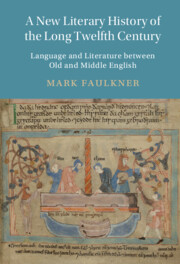 A New Literary History of the Long Twelfth Century
A New Literary History of the Long Twelfth Century Book contents
- A New Literary History of the Long Twelfth Century
- Cambridge Studies in Medieval Literature
- A New Literary History of the Long Twelfth Century
- Copyright page
- Dedication
- Contents
- Figures
- Acknowledgements
- Conventions Used
- Abbreviations
- Part I Preliminaries
- Part II The Affordances of English
- Chapter 3 English in the Linguistic Ecology of the Long Twelfth Century
- Chapter 4 English as a Language of Documentary Record
- Chapter 5 English as a Language for Writing History
- Chapter 6 English as a Language for Sermon Writing
- Chapter 7 Conclusion
- Bibliography
- Index
- Cambridge Studies in Medieval Literature
Chapter 4 - English as a Language of Documentary Record
from Part II - The Affordances of English
Published online by Cambridge University Press: 14 July 2022
- A New Literary History of the Long Twelfth Century
- Cambridge Studies in Medieval Literature
- A New Literary History of the Long Twelfth Century
- Copyright page
- Dedication
- Contents
- Figures
- Acknowledgements
- Conventions Used
- Abbreviations
- Part I Preliminaries
- Part II The Affordances of English
- Chapter 3 English in the Linguistic Ecology of the Long Twelfth Century
- Chapter 4 English as a Language of Documentary Record
- Chapter 5 English as a Language for Writing History
- Chapter 6 English as a Language for Sermon Writing
- Chapter 7 Conclusion
- Bibliography
- Index
- Cambridge Studies in Medieval Literature
Summary
This chapter examines ten or so English language or bilingual documents obtained, produced, copied, adapted and forged at Christ Church Canterbury between the 1090s and the mid 1150s. Beginning with a remarkable series of bilingual writs issued by Henry I and his successors, it also analyses a purported bilingual notification of Cnut, apparently confected around 1100, and a remarkable English-language version of a diploma of Cnut, relating to the port of Sandwich, produced at approximately the same time, as well as a document of Æthelred contrived from it fifty years later. Consideration of the documents suggests this activity involved monks, both English and French, who felt the use of English made their contentious claims more plausible. In the hundred years after the Norman Conquest, these men continued, and even expanded, the range of ways in which English could be used as a language of documentary record.
Keywords
- Type
- Chapter
- Information
- A New Literary History of the Long Twelfth CenturyLanguage and Literature between Old and Middle English, pp. 102 - 148Publisher: Cambridge University PressPrint publication year: 2022
